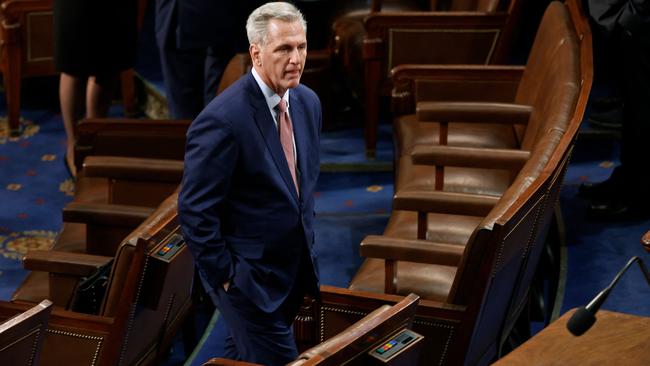US House Speaker vote: Hardliner Jim Jordan emerges as potential contender after day of chaos
All the Republicans who voted against Kevin McCarthy as House Speaker backed Jim Jordan, who claims he doesn’t want the role and supports the GOP leader.

Hardline Republican Jim Jordan is emerging as a potential contender for the US House Speaker seat after party leader Kevin McCarthy lost three ballots in a historic day of chaos.
The new US Congress was thrown into disarray on its first day as rebel right-wing Republicans moved to Mr McCarthy from becoming Speaker, with 19 Republicans voting against him in the first two ballots and 20 in the third. In the most unpredictable poll in a century, all of Mr McCarthy’s GOP opponents voted for Mr Jordan, who has said he didn’t want the position and has supported Mr McCarthy throughout.
The 58-year-old congressman from Ohio is known for his combative, in-your-face style of politics but his fellow hardliners would prefer him to lead them than Mr McCarthy, a divide that exposes the deep fractures within the GOP about the direction of the party and the lack of consensus over who should lead it forward.
The House has adjourned until noon Wednesday ET, (4am Thursday AEDT).
Here’s how it all unfolded.
McCarthy loses third ballot, House adjourns
Kevin McCarthy has again failed to cross the threshold to win the House speaker post, with 20 Republicans voting against him on the third ballot.
The House has now adjourned until noon Wednesday ET (4am Thursday AEDT as Republicans remained gridlocked over the speakership.
Rep. Tom Cole (R., Okla.) made the motion to adjourn the House, and the motion was accepted with cheers from both parties.
After three ballots, it has become clear that Mr McCarthy did not have support at the moment to win the speakership. He will likely spend the evening and morning trying to sway his detractors.
On the first two ballots 19 Republicans voted against Mr. McCarthy, but Republican Rep. Byron Donalds of Florida joined Mr. McCarthy’s opponents in the third ballot.
Mr McCarthy could lose just four votes because all Democrats voted for Rep. Hakeem Jeffries of New York.
All of Mr McCarthy’s opponents voted for Ohio Rep. Jim Jordan, who has said he doesn’t want to be speaker and supported Mr. McCarthy.
The House chamber has now taken on a feeling of fatigue. Many of the families that crowded into the upstairs gallery at noon to watch the opening day of Congress have left.
Lawmakers have not yet been sworn-in, and won’t be until the speaker election wraps up. Most incoming lawmakers are unsure when that will be.
Mr McCarthy spent a lot of time on his phone while voting continued. His aide who had seemed to be tracking the votes is not sitting next to him.
Former speaker Nancy Pelosi seems to be enjoying her first day in decades as a rank-and-file member, sitting near the back with longtime friend Anna Eschoo, also a California Democrat.

McCarthy on track to lose third round
Kevin McCarthy appears on track to lose the third ballot to be House speaker.
Rep. Michael Cloud of Texas was the fifth Republican to vote against Mr. McCarthy, bringing him over the four-vote threshold to win the gavel, if 434 House members are voting and all Democrats vote for Rep. Hakeem Jeffries of New York as they have been.
On the third vote, Byron Donalds (R., Fla.) switched from Mr McCarthy to Jim Jordan, marking the first vote switch.
Mr Donalds had voted for Mr McCarthy on the first two ballots. Nick Raineri, an adviser to Mr Donalds, said that he had promised Mr McCarthy his support for the first two ballots, but after he was willing to vote for someone else.
Mr Jordan has said he doesn’t want to be speaker and is supporting Mr McCarthy.
On the first two votes for speaker, Mr McCarthy lost 19 Republicans which was too many to be elected Speaker, given all Democrats voted for Rep. Hakeem Jeffries of New York.
During the first two rounds of voting, 203 Republicans voted for Mr McCarthy while 19 Republicans opposed him.
Mr McCarthy has said he will keep voting until he wins.
Third ballot begins
Incoming Majority Whip Steve Scalise (R., La.) nominated Kevin McCarthy for the third round of voting. Mr. McCarthy was nominated by fellow party leaders Elise Stefanik of New York and Jim Jordan of Ohio for the first two rounds, respectively.
Mr. McCarthy had a smile on his face when Mr. Scalise stepped to the podium, looking jovial, even as it appears he still lacks the support to win the speakership.
Mr. Scalise said Mr. McCarthy — and all Republicans — wanted to lower inflation and the cost of gas, and needed to wrap up the votes in order to move forward on legislation.
“We can’t stop solving those problems until we elect Kevin McCarthy,” he said.
Notably, Mr. Scalise, who is seen as a possible candidate if Mr. McCarthy steps aside, didn’t aim his speech at the 19 Republicans who declined to vote for Mr. McCarthy in the first two rounds. He spoke in broad terms to Republicans and Democrats.
Ralph Norman (R., S.C.) told reporters before the vote that he believes more dissenters will join them on the third ballot.
After Mr. Scalise spoke, Democrats renominated Rep. Hakeem Jeffries of New York, while McCarthy critic Rep. Chip Roy (R., Texas) nominated Mr. Jordan for the job. Mr. Jordan has backed Mr. McCarthy, but the holdouts united behind him in the second round after an endorsement from Rep. Matt Gaetz of Florida, and were expected to do so again in the third round.

Both sides dig in ahead of third vote
Kevin McCarthy’s supporters and detractors remained dug into their positions headed into the third vote for speaker.
Rep. Steve Scalise (R., La.), the No. 2 House Republican, who supports Mr. McCarthy said: “Everybody knew that this would be going on, and we are going to work through it.”
Mr. Scalise’s name has been brought up as a possible alternative to Mr. McCarthy if the California Republican is unable to get the votes. However, Mr. Scalise has said he will remain supportive of Mr. McCarthy.
Meanwhile, Rep. Ralph Norman of South Carolina, a McCarthy opponent, said he expected additional votes against Mr. McCarthy in the next round of voting.
“I’m excited we’re doing it. This is how the system works,” he said.
McCarthy loses second round
Republican leader Kevin McCarthy has fallen short of victory in the first two rounds of voting for speaker of the House, as his allies and detractors refused to give ground, underlining the fractious nature of the GOP conference on its first day in control of the chamber.
Mr McCarthy needed the support of almost all Republicans due to the party’s thin majority of 222 to 212, and the results in both rounds put him short of the majority of lawmakers present and voting – or 218 of the current 434 members – required to secure the speakership. The speaker vote hadn’t gone to a second ballot since 1923.
Among GOP lawmakers, the vote in the first round was 203 for Mr. McCarthy and 10 for Rep. Andy Biggs (R., Ariz.), with nine GOP votes for other current and former lawmakers including Rep Jim Jordan (R., Ohio). In the second round, holdouts backed Mr. Jordan for speaker, just moments after he formally nominated Mr. McCarthy. Mr. McCarthy got 203 votes to 19 for Mr. Jordan.

Democratic leader Hakeem Jeffries of New York received all 212 Democratic votes.
Kevin McCarthy has fallen short in his bid to be House Speaker in the second round of voting with his opponents digging into their position. Nineteen Republicans opposed Mr. McCarthy, the same number as he lost in the first ballot.
Because all Democrats voted for Democrat House leader Hakeem Jeffries, Mr. McCarthy could only lose four Republicans in order to be elected.
In the second round, all of Mr. McCarthy’s Republican opponents supported Rep. Jim Jordan (R., Ohio), a conservative Republican who used to clash with leadership but has become an ally of Mr. McCarthy’s. Mr. Jordan gave the nominating speech for Mr. McCarthy on the second ballot and supported him.
What happens next
Voting can continue as long as it takes for a lawmaker to secure enough votes. The votes can take place while conversations are going on in the background or votes can end for a day and give more time for negotiating.
In December 1855 — before the voting date was set in January — lawmakers gathered for the speaker vote but repeatedly failed to get a majority. It took 133 votes and until February before the House elected a speaker — and only then because the House voted to change the rules to allow the speaker to be elected by a plurality rather than the majority.
Because the speaker vote is the first vote members take in a new Congress, if it isn’t resolved quickly, the House will come to a standstill. Lawmakers can’t vote on legislation, work on their committees or do any other business until a speaker is chosen.
This situation hasn’t happened in a century. While past recent speakers have faced intraparty challenges, none of the disputes have derailed the vote. No speaker race has gone to a second ballot since 1923. That year it took nine ballots.
Second round voting begins
US House politicians have begun a second round of voting to install a speaker after Kevin McCarthy failed to secure enough votes to earn that title during the first round of voting.
However it became clear almost immediately that Mr McCarthy was set to fall short of a majority in this round too, after five Republican candidates at the start of the alphabet voted against him, deflating any hopes of a quick resolution to the standoff.
Reps. Andy Biggs (R., Ariz.), Dan Bishop (R., N.C.), Lauren Boebert (R., Colo.), Josh Brecheen (R., Okla.) and Rep. Michael Cloud (R., Texas) all opposed Mr. McCarthy. Assuming all Democrats vote for Mr. Jeffries again, Mr. McCarthy can’t lose more than four Republicans.
Mr. McCarthy’s detractors voted for Rep. Jim Jordan (R., Ohio), conservative who has become a McCarthy ally in recent years. Mr. Jordan gave the nominating speech for Mr. McCarthy this vote in the hopes it would win some conservatives, but they didn’t budge.
By the letter G”, there were eight Republicans who voted for Mr. Jordan. Mr. McCarthy failed the first ballot with all 212 Democrats voting for Rep. Hakeem Jeffries (D., N.Y.), 203 Republicans voting for Mr. McCarthy and 19 Republicans voting for another Republican. It is the first time in 100 years that a speaker candidate didn’t win on the first vote.
Mr Jordan (R., Ohio) had nominated Mr. McCarthy (R., Calif.) in advance of the second round, saying that lawmakers have to make progress in addressing important issues such as immigration, inflation and “a government that has been weaponized against we the people.”
“I think that Kevin McCarthy is the right guy to lead us, and I really do, or I would not be up here,” Mr. Jordan said.
Minutes later, Rep. Matt Gaetz (R., Fla.), a staunch McCarthy opponent, nominated Mr. Jordan for the job.
“Jim Jordan is humble — perhaps today humble to a fault, and maybe the right person for the job of speaker of the house isn’t someone who wants it so bad,” said Mr. Gaetz, who voted for Rep. Andy Biggs (R., Ariz.) in the first round.
Six of Mr. Jordan’s Republican colleagues, including Lauren Boebert of Colorado, Michael Cloud of Texas and Anna Paulina Luna of Florida, cast their vote for him as speaker during the first round.
Rep. Hakeem Jeffries (D., N.Y.) won the 212 votes cast by his Democratic colleagues. A total of 19 Republicans declined to back Mr. McCarthy, causing him to fall short of the 218 majority of lawmakers present and voting needed to secure the speakership.

McCarthy loses first round of voting
House Republican leader Kevin McCarthy has lost the first round of voting for House Speaker, in an historic vote that has turned into the most unpredictable in a century.
Mr McCarthy, 57, lost the first round vote to Democrat minority leader Hakeem Jeffries by 203 votes to 212, 15 votes fewer than the 218 he needed to secure the speakership, as lawmakers braced for a drawn-out session due to hardened opposition from some conservatives.
The speaker vote now goes to a second ballot – which hasn’t happened since 1923 – with hardliners now expected to put up their own candidate
Mr McCarthy has long coveted the role of speaker, having withdrawn from the race in 2015 amid a number of blunders and a right-wing revolt.
He spent the weekend scrambling to get the votes necessary from House Republicans to win the gavel. But his bid remained up in the air as voting began and quickly turned into a first-round loss, with Mr McCarthy looking to come up short early in the voting.
Because Republicans have such a narrow majority over Democrats — 222 to 212, with one vacancy — Mr. McCarthy needs almost unanimous support. Politicians and aides said the outcome is uncertain. If all Democrats back their own leaders as expected, Mr. McCarthy can lose only four votes in the roll-call vote, in which the winner must get 218 votes or the majority of all those present and voting.
Because Mr. McCarthy could only lose four votes, it became clear by the time the alphabetic roll call hit the “C” names that he would be unable to secure the number needed.
A failure of Mr. McCarthy’s bid would be unprecedented in modern history and underscore the shaky state of the Republican majority and the raucous nature of its conservative wing, which has caused trouble for party leaders in the past decade.
The initial vote was 203 for Mr. McCarthy, 10 for Rep. Andy Biggs (R., Ariz.), six for Rep. Jim Jordan (R., Ohio), one for Rep. Jim Banks (R., Ind.), one for Rep. Byron Donalds (R., Fla.) and one for outgoing Rep. Lee Zeldin (R., N.Y.). Democratic leader Hakeem Jeffries of New York received 211 votes from all House Democrats.
Mr. McCarthy and his allies said they were prepared to take as many rounds of votes as needed to wear down opponents, who they painted as self-serving and detrimental to the party.
Mr McCarthy on Tuesday morning (Wednesday AEDT) suggested that he may try to wear down his opponents, saying he doesn’t have a problem with “getting a record for the most votes for speaker.”
As Mr. McCarthy walked into the chamber for the first vote, he told reporters there was no scenario where he would drop out of the race. “Instead of uniting to put the country first, we now have some members that want to put themselves first. You cannot reward bad behaviour,” he said.
His critics also stood their ground, casting the vote as an important moment for the party to stake out a firmer conservative direction.
More follows
Dow Jones, AFP



To join the conversation, please log in. Don't have an account? Register
Join the conversation, you are commenting as Logout